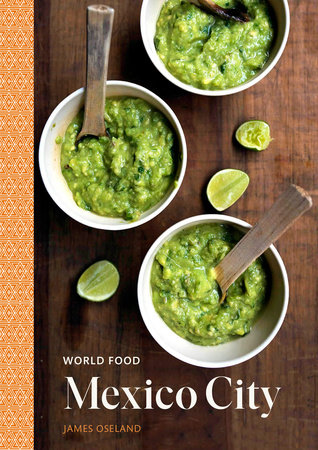Excerpt
World Food: Paris
The City of Savoir Vivre It is a rain-slicked spring evening in Paris’s fifteenth arrondissement. Dusk has begun to fall as Frédéric Ramade, a film director in his fifties, walks by a crowded bistro. Through its steamy
windows, a waiter can be seen taking bread in a cloth-lined basket to a table. Ramade too is carrying bread; a baguette is tucked under his arm. It’s one of two gifts he is bringing his friend, the art director and cookbook author Bénédict Beaugé. In Ramade’s backpack is a bottle of wine he hopes will pair well with what Beaugé plans to serve for dinner.
In his flat on Rue de Lourmel, Beaugé hears the knock on his door and smiles: his invitation specified eight o’clock, and it’s twenty minutes after. It is an unwritten rule in Paris that dinner guests should allow their hosts a bit of extra time to make sure everything is in order. Beaugé quickly checks that all of the appetizers are in place. Yes. There on his cutting board, beside a stack of books, are a bowl of garlic-and-lemon-spiked green olives from an excellent Moroccan shop in the Belleville neighborhood and cold, thick slices of the ham known as
jambon de Paris. In his seventies, Beaugé might appreciate his guest offering a hand, but he still has the energy and passion to tend to everything here, from the bowl of freshly made mayonnaise to the vase of pink peonies on the kitchen counter.
Welcomed in, Ramade accepts a warm kiss on the cheek and a glass of wine from Beaugé. It’s a ten-year-old Pinot Noir, just the thing for dispelling the evening chill. “Oh, my goodness,” murmurs Ramade at the table as he bites into the first course, meaty spears of tender blanched asparagus to be dipped in the mayonnaise. Beaugé insists the credit goes not to him but to the season. Asparagus, the men agree, is one of the real triumphs of spring.
Ramade and Beaugé are food obsessives. Anywhere else in the world they might be thought of as extreme. But their interest in pursuing excellence in the things they cook and eat is something that virtually everyone in this city shares in one way or another. Their first meeting was in the 1990s at one of Beaugé’s legendary
déjeuners du dimanche (Sunday lunches). These affairs started out for close friends (and whomever those friends might be having a fling with at the time), but eventually, scores of people began showing up, with Beaugé cooking every dish single-handedly in his modestly sized kitchen. “Do I remember correctly,” Ramade asks, eyes sparkling behind his glasses, “that during one of your lunches that famous cross-dressing coloratura really stood on your coffee table and sang?”
Beaugé laughs at the memory. “Yes, between the soup and the coq au vin, I believe.” Mostly what he remembers, though, is what a mad dash it was to get every plate to the table at optimal temperature. But this is why so many Parisian three-star chefs, from Alain Passard
to the late, great Joël Robuchon, have proudly called Beaugé their friend: When it comes to French cooking, especially of the traditional variety, Beaugé is a guru.
It’s time for the main course. Beaugé opens the oven door, releasing the scent of roast veal and caramelized shallots. In a cast-iron casserole on the table sits a gratin of new potatoes baked with cream, one of his specialties. All of the dishes are spare, but Beaugé’s commitment to cooking them exactly as he was taught by his mother and grandmothers yields impeccable results.
He uncorks the bottle Ramade brought, and sets out a crock of Dijon mustard. Rain patters against the window. “A roast in cold weather makes you feel so comfy,” says Beaugé as he spoons pan gravy over the veal, his concentration unbroken. “Don’t you think?”
The French idiom
savoir vivre means having an intelligent approach to enjoying life, greeting each situation with refinement and poise. Parisian meal preparation is an example of this concept. To cook the dishes in this book is to embody this attention to detail, to tap into the wealth of knowledge that the French have accumulated over centuries of careful practice in their kitchens. And so, when you prepare these recipes, take time to observe the particulars, from attentively selecting the right variety of butter and being vigilant about continuously and gently stirring the beurre blanc sauce to prevent it from breaking to the position of the plates you place on the table. Follow these steps and you begin to understand what distinguishes the remarkable cuisine of Paris.
Even a dish as easy to prepare as roast lamb studded with garlic and rosemary will demonstrate the advantages of French technique. Endeavoring to make somewhat more complex recipes, such as classic quiche Lorraine, a custard of eggs, cream, and bacon in a golden, buttery
pâte brisée tart shell, will be rewarded. With practice, you might discover the thrill of making your own puff pastry, a sublimely flaky dough used in three recipes in this book: pastry cups stuffed with mushrooms and chicken in béchamel sauce, a savory pastry topped with salt-packed anchovies and onion marmalade, and a strawberry dessert with vanilla custard. Whether it means choosing only the freshest-looking bundles of herbs with which to make stuffed garden tomatoes, or considering what wine would fortify your guests to go back out into a misty spring night, the Parisian way is a truly civil approach to dining.





